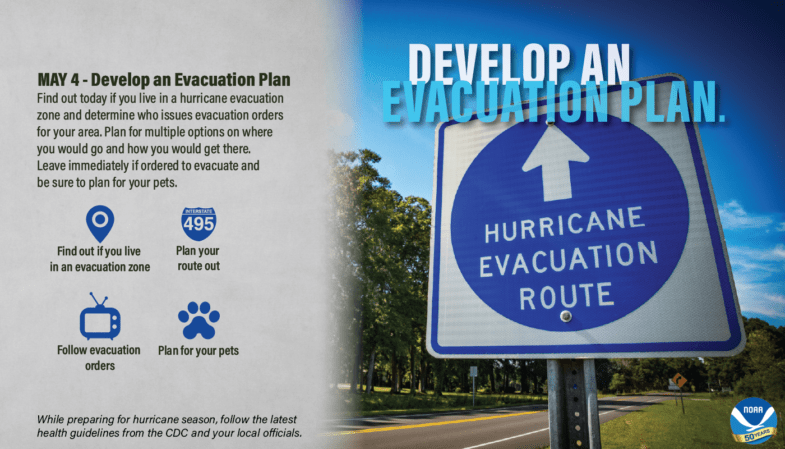0 Active Threats To Track
SUPPORT TRACK THE TROPICS
Over the last decade plus if you appreciate the information and tracking I provide during the season along with this website which donations help keep it running please consider a one time... recurring or yearly donation if you are able to help me out...
Venmo: @TrackTheTropicsLouisiana
Website: TrackTheTropics.com/DONATE
Venmo: @TrackTheTropicsLouisiana
Website: TrackTheTropics.com/DONATE
Track The Tropics is the #1 source to track the tropics 24/7! Since 2013 the main goal of the site is to bring all of the important links and graphics to ONE PLACE so you can keep up to date on any threats to land during the Atlantic Hurricane Season! Hurricane Season 2025 in the Atlantic starts on June 1st and ends on November 30th. Do you love Spaghetti Models? Well you've come to the right place!! Remember when you're preparing for a storm: Run from the water; hide from the wind!
Tropical Atlantic Weather Resources
- NOAA National Hurricane Center
- International Meteorology Database
- FSU Tropical Cyclone Track Probabilities
- Brian McNoldy Atlantic Headquarters
- Brian McNoldy Tropical Satellite Sectors
- Brian McNoldy Infrared Hovmoller
- Brian McNoldy Past TC Radar Loops
- Weather Nerds TC Guidance
- Twister Data Model Guidance
- NOAA Tropical Cyclone Tracks
- Albany GFS/ EURO Models/ Ensembles
- Albany Tropical Cyclone Guidance
- Albany Tropical Atlantic Model Maps
- Pivotal Weather Model Guidance
- Weather Online Model Guidance
- UKMet Model Guidance/ Analysis/ Sat
- ECMWF (EURO) Model Guidance
- FSU Tropical Model Outputs
- FSU Tropical Cyclone Genesis
- Penn State Tropical E-Wall
- NOAA HFIP Ruc Models
- Navy NRL TC Page
- College of DuPage Model Guidance
- WXCharts Model Guidance
- NOAA NHC Analysis Tools
- NOAA NHC ATCF Directory
- NOAA NCEP/EMC Cyclogenesis Tracking
- NOAA NCEP/EMC HWRF Model
- NOAA HFIP Model Products
- University of Miami Ocean Heat
- COLA Max Potential Hurricane Intensity
- Colorado State RAMMB TC Tracking
- Colorado State RAMMB Floaters
- Colorado State RAMMB GOES-16 Viewer
- NOAA NESDIS GOES Satellite
- ASCAT Ocean Surface Winds METOP-A
- ASCAT Ocean Surface Winds METOP-B
- Michael Ventrice Waves / MJO Maps
- TropicalAtlantic.com Analysis / Recon
- NCAR/RAL Tropical Cyclone Guidance
- CyclonicWX Tropical Resources
Hurricane Preparedness: Develop an Evacuation Plan
The first thing you need to do is find out if you live in a storm surge hurricane evacuation zone or if you’re in a home that would be unsafe during a hurricane. If you are, figure out where you’d go and how you’d get there if told to evacuate. You do not need to travel hundreds of miles. Identify someone, perhaps a friend or relative who doesn’t live in a zone or unsafe home, and work it out with them to use their home as your evacuation destination. Be sure to account for your pets, as most local shelters do not permit them. Put the plan in writing for you and those you care about.

Thanks to NOAA for the above graphic and video!
Have an Evacuation Plan Thanks to FLASH for the information below!
If You Must Evacuate
Before You Go
Evacuate Immediately
FIND YOUR EVACUATION ZONE AND PLAN NOW BELOW!
FLASH.org

Thanks to NOAA for the above graphic and video!
Have an Evacuation Plan Thanks to FLASH for the information below!
- Discuss what to do in an evacuation with everyone in your family.
- Know where you will go if an evacuation is called.
- Review at least two exit routes from your home or neighborhood to a designated meeting place for your family.
- Don't forget about your pets; they are not allowed at most public shelters. Pack Your Bags
- After a disaster, you may not be able to return to your home for some time.
- Assemble everything your family will need in advance if you must evacuate your home.
- Pack one change of clothes and shoes per person as well as one blanket or sleeping bag per person.
- Write down the name of your insurance company, policy number and telephone number and keep it in a safe place.
- Include an extra set of car keys, your credit cards, cash and/or traveler's checks. Don't forget your important emergency contact numbers.
- Create a first aid kit that includes your family’s prescription medications.
- Pack sanitation supplies and special items for babies, senior citizens or disabled family members
- Bring extra eyeglasses and a favorite family board game to help pass the time away from home.
If You Must Evacuate
Before You Go
- Unplug electrical equipment such as radios, televisions and small appliances. Leave freezers and refrigerators plugged in unless there is a risk of flooding. If there is damage to your home and you are instructed to do so, shut off water, gas and electricity before leaving.
- Post a note telling when you left and where you are going.
- Don't forget about your pets and be sure to lock your home.
Evacuate Immediately
- Evacuate immediately if authorities tell you to do so.
- Listen to your battery-powered radio and follow the instructions of local emergency officials.
- Wear layered warm, dry clothing and sturdy shoes.
- Be sure to take your disaster supply kit with you to a shelter or safe location. Use travel routes specified by local authorities -- don't use shortcuts.
FIND YOUR EVACUATION ZONE AND PLAN NOW BELOW!
FLASH.org
Complete Hurricane Preparedness Guide:
Determine Your Risk
Develop An Evacuation Plan
Assemble Disaster Supplies
Secure An Insurance Checkup
Strengthen Your Home
Check On Your Neighbor
Complete Your Written Hurricane Plan
Develop An Evacuation Plan
Assemble Disaster Supplies
Secure An Insurance Checkup
Strengthen Your Home
Check On Your Neighbor
Complete Your Written Hurricane Plan

 DONATE
DONATE